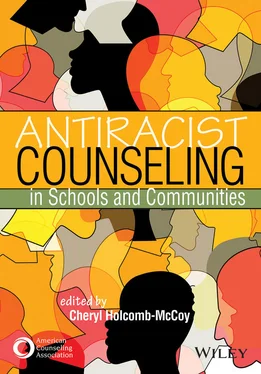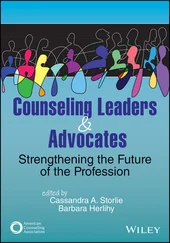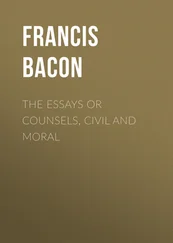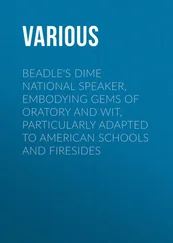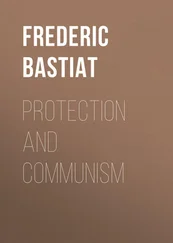1 Cover
2 Title Page
3 Copyright Page Copyright © 2022 by the American Counseling Association. All rights reserved. Printed in the United States of America. Except as permitted under the United States Copyright Act of 1976, no part of this publication may be reproduced or distributed in any form or by any means, or stored in a database or retrieval system, without the prior written permission of the publisher. American Counseling Association 2461 Eisenhower Avenue • Alexandria, VA 22331 Associate Publisher • Carolyn C. Baker Digital and Print Development Editor • Nancy Driver Senior Production Manager • Bonny E. Gaston Copy Editor • Beth Ciha Cover and text design by Bonny E. Gaston Library of Congress Cataloging-in-Publication Data Names: Holcomb-McCoy, Cheryl, editor. | American Counseling Association. Title: Antiracist counseling in schools and communities / Cheryl Holcomb-McCoy, editor. Description: Alexandria, VA : American Counseling Association, 2022. | Includes bibliographical references and index. Identifiers: LCCN 2021033771 | ISBN 9781556204098 (paperback) Subjects: LCSH: Cross-cultural counseling—United States. | Anti-racism—United States. | Social justice—United States. | Racism—United States—Psychological aspects. Classification: LCC BF636.7.C76 A55 2022 | DDC 158.3—dc23 LC record available at https://lccn.loc.gov/2021033771
4 Dedication Page
5 Preface
6 Acknowledgments
7 About the Editor
8 About the Contributors
9 CHAPTER 1: The Pathway to Antiracism: Defining Moments in Counseling History
A History of Racism in Counseling A History of Racism in Counseling Helping professionals, in particular counselors, have also been touched by racism. Over the past 4 decades, social scientists, including counselors, have moved away from defining race in biological terms and toward defining it as a social and political construct that in turn impacts the counseling process as well as counselors’ and clients’ conceptualization of problems. The foundational theories and frameworks of professional counseling emerged from a predominantly white, middle-class context (Gerig, 2014; Ratts & Pedersen, 2014). Therefore, racism within the profession has not necessarily been a focal point. Over the past 30 years, much has been written about clients who do not originate from the dominant society (Butler & Shillingford-Butler, 2014; Wade, 2006). However, less has been written about racism within the profession. D’Andrea (1992) challenged the profession to take on racism and even warned of silence denoting professionals’ complicity in racism in communities where they worked. In a more recent opinion piece in Counseling Today , Arredondo et al. (2020) suggested that there are still unintentional and covert forms of racism and racial injustice within counselor training, research, and practice. Several iterations of counseling movements have emerged out of the experiences of Black and Brown counselors and clients (e.g., the Black psychology movement). Each movement has addressed racism but without specific attention to antiracism. The remainder of this chapter provides descriptions of these counseling movements: Black/African-centered psychology (e.g., Jones, 1972), cross-cultural counseling and psychology (e.g., Atkinson et al., 1989), multicultural counseling (e.g., Lee, 1991), and social justice counseling and advocacy (Holcomb-McCoy, 2007). Having a common language makes it easier to communicate a commitment to racial equity and creates a platform for coordinated work toward antiracist outcomes. Also, this chapter includes definitions of antiracism and antiracist counseling and introduces an antiracist framework of school counseling.
Other Forms of Racism Other Forms of Racism Anti-Black racism is typically characterized as prejudice and bias that is directed at people of African descent. At the core of anti-Blackness is a devaluation and marginalization of Black people through policies and practices, such as continued overpolicing in Black communities, the criminalization of Black children, and brutality against Black people in general. Colorism, a type of discrimination in which lighter skin is privileged over darker skin, is aligned with the concept of anti-Black racism. Non-Black people with dark skin, such as Native Americans or darker Cuban Americans, are often faced with anti-Black racism. The Black Lives Matter (BLM) movement has highlighted the global history of anti-Black racism and simultaneously propelled a national focus on antiracism. BLM, founded in 2013 in response to the killings of unarmed Black people, has become a global movement to eradicate white supremacy and combat anti-Black racism. The popularity of BLM has grown dramatically since 2013. Public opinion on BLM was net negative in 2018 and grew increasingly popular throughout 2019 and 2020. A June 2020 poll found that 67% of adult Americans expressed some support for the BLM movement. This shift in support indicates increased societal understanding of systemic injustices based on race and targeted violence toward Black people. It is essential to recognize that acknowledging that Black lives matter does not negate anyone else’s life or imply that others do not matter. In a society in which the experiences and input of Black and Brown populations are not honored and racist policies are common, counseling professionals must speak out against unjust and racist systems. The increased incidence of anti-Asian and anti-immigrant racism—fueled in part by former President Donald Trump’s xenophobic response to novel coronavirus and immigration policies—has prompted an outcry among Asian American and immigrant communities, sparking nationwide protests led by the rallying cries “Stop Asian Hate” and “Defund Hate!” Some people still have trouble grasping the idea that Asian Americans can be victims of racism at all, in part because of the myth of the model minority—the narrative that Asians have managed to succeed economically and educationally in the United States, especially in comparison with other racial groups.
Antiracism Is Not Critical Race Theory Antiracism Is Not Critical Race Theory In recent years, the concept of antiracism has been used synonymously with critical race theory (CRT), a theory originated by Derrick Bell, a legal scholar who argued that traditional approaches to legal studies lacked the voice and narratives of marginalized persons (Delgado, 1995; Delgado & Stefancic, 2000). Bell described CRT as a form of law that speaks to the social and cultural contexts in which individuals live. Critical race theorists view racism as a normal part of American society that is woven into the fabric of all U.S. systems in such a way that people of all races see it as normal. The dominant strategy of CRT is to unmask and expose racism and racist practices and policies. As a matter of fact, CRT led to the study of microaggressions, subtle insults (verbal, nonverbal, and/or visual) directed toward people of color, often automatically or unconsciously. Antiracism, in contrast, denotes actions to dismantle racist practices, policies, and structures. Following is an excerpt from one of Derrick Bell’s (1995) law review papers explaining how antiracism intersects with CRT: Critical race theory writing and lecturing is characterized by frequent use of the first person, storytelling, narrative, allegory, interdisciplinary treatment of law, and the unapologetic use of creativity. The work is often disruptive because its commitment to antiracism goes well beyond civil rights, integration, affirmative action, and other liberal measures. This is not to say that critical race theory adherents automatically or uniformly “trash” liberal ideology and method (as many adherents of critical legal studies do). Rather, they are highly suspicious of the liberal agenda, distrust its method, and want to retain what they see as a valuable strain of egalitarianism which may exist despite, and not because of, liberalism. (p. 899)
Antiracism and School/Community Counseling An Antiracist Framework of School Counseling Conclusion References
Читать дальше
